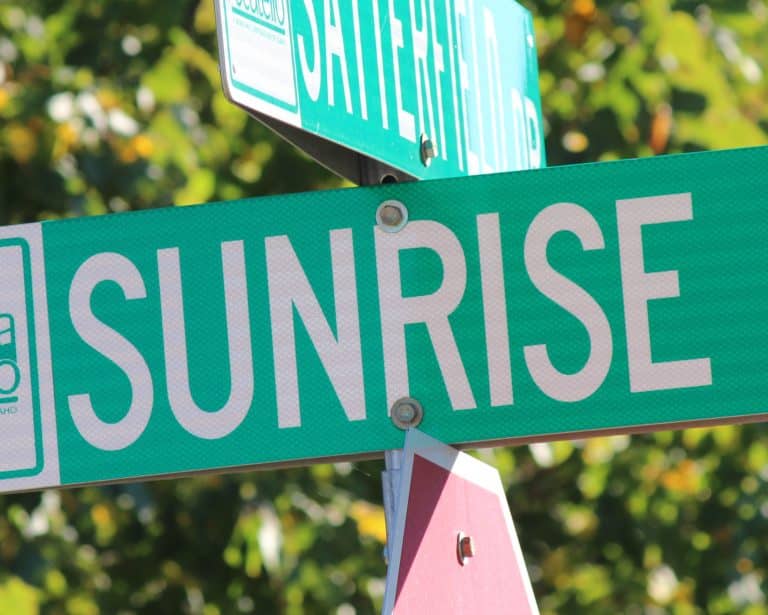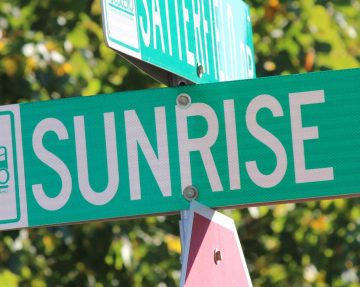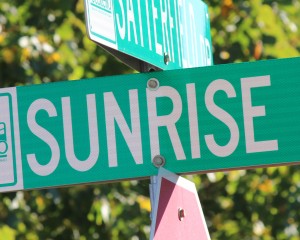By Jenny
I trudged slowly up the hill. I guess you could say I was running, but really I wasn’t moving very fast. Despite the hour that I had already been running, my legs were still stiff. I was hoping that the sun would rise soon. The sunrise was usually a good boost to my motivation. I had left my passion for running at home that morning. All I had running through my head was self-doubt. I had all these great plans for my life. Yes, I was just crazy enough to have running a marathon on that list. But here I was, simply trudging up a hill, looking at the top and wondering if I would actually get there.
Like the boy Santiago, in the book The Alchemist, by Paulo Cohelo, my heart was deceiving me.
[box] “Why do we have to listen to our hearts?” the boy asked, when they had made camp that day.
“Because, wherever your heart is, that is where you’ll find your treasure.”
“But my heart is agitated,” the boy said. “It has its dreams, it gets emotional, and it’s become passionate over a woman of the desert. It asks things of me, and it keeps me from sleeping many nights, when I’m thinking about her.”
“Well, that’s good. Your heart is alive. Keep listening to what it has to say.” The Alchemist pg. 128[/box]
Santiago goes on the have a conversation with his heart that I think anyone who follows their personal legend can relate to. I have had many similar conversations with my own heart lately. His heart tells him:
[box] “Even though I complain sometimes…it’s because I’m the heart of a person, and people’s hearts are that way. People are afraid to pursue their most important dreams, because they feel that they don’t deserve them, or that they’ll be unable to achieve them.” The Alchemist, pg. 130[/box]
I was nearing the top of the hill I was running on and it started to flatten out. As I emerged at the top, I looked up to see the street sign above me: Sunrise. At that moment, the rays of the morning light began to peek over the tops of the mountains. I was suddenly wrapped in the sun’s warm glow. It was so small and simple really. If I hadn’t looked up I wouldn’t have even seen the sign. But to me it was everything. It meant that my worries and concerns were important even to God. My sunrise had come, along with an omen from a powerful, loving universe that knows the language of my heart, my heart that was treacherously trying to deflate my dreams. I felt overwhelmingly that there is a God, who knows me, knows what I am capable of, and knows what my life can mean.
Thinking about personal legends, omens, and the universe conspiring for my good is fairly new to me. Most of my adult life was spent in a safe and simple mold of a specific role that I was culturally conditioned to accept. I was sleepwalking through my life. And when I awakened, this hill lay before me. It was steep and daunting, filled with pain and struggle that has helped me to discover my own power and develop a deeper connection to a loving God.
As a Mormon woman, I was influenced by a consciousness that told me I had one role to fulfill in life. Multiply and replenish the earth. It was the same role that every woman was “commanded” to fulfill. Commanded….the word causes a churning in my stomach now. It is a word that doesn’t belong in a universe that I now view as infinitely good and loving. I don’t believe in a God who commands, because I have met a God who pushes me toward my greatness through love and compassion, rather than coercion.
As a budding feminist in college, I began right away to follow my heart and my dreams. During my first week at BYU I collected a handful of papers about study abroad programs and began working on a plan to travel. A year later, I arrived back at BYU after an intense internship in Southern Bavaria. My bishop asked me to meet with him. He quickly asked me about my travels and then turned the conversation to the fact that a guy I had been dating before I left was now dating someone else in the ward. When I told him that the guy had dumped me while I was gone, my bishop blamed me. He told me that I needed to be more focused on getting married because that was my main priority. Travelling and fulfilling my dreams was not as important.
Back then I was more accustomed to listening to my leaders than listening to my heart. When I think back on this conversation with my bishop, I don’t think that his counsel changed the course of my life too much. I don’t think the bishop’s counsel affected my choices, so much as it affected the relationship I had to those choices. Over the last thirteen years since I sat in his office, I have spent most of my time and energy in marriage and family. Getting married and having a large family was one of my biggest dreams. The problem was not that I had a family and chose to stay home and raise them. The problem was how I viewed myself as a wife and mother. I saw myself as a martyr. I was sacrificing my dreams for my family. I needed to give up who I was as an individual and recreate my identity around my family. In essence, I became my family, inseparable from my husband and children. For a time, I lost some vital aspects of myself.
It wasn’t just the bishop’s counsel on that fateful day that caused me to feel like my dreams and passions needed to be subsumed. It was years of cultural conditioning that told me that motherhood would be everything I would ever have or need. It was a cultural mindset that told me life was about fear, sacrifice, obedience, commandments, and authority that existed outside of me. I was never taught about following my heart and claiming authority to live my own life of authenticity. Even now, as I am rediscovering those vital parts of myself and doing things that I love outside of motherhood, I am finding many harsh critics of my choices. They say that I just don’t understand how important I am as a mother. They say that I’m being selfish. They say that I’m on the wrong path.
[box] “If someone isn’t what others want them to be, the others become angry. Everyone seems to have a clear idea of how other people should lead their lives, but none about his or her own.” The Alchemist, Pg. 16[/box]
Maybe it scares them to see the change of course my life has taken. Sometimes it scares me too. Once I travelled the straight and narrow, and now I scale a winding hill, sometimes barely trudging. Once I was sleepwalking through my life and now I am wide awake, following my heart, my all-too-often-treacherous-heart. Listening to my heart has made me vulnerable and open to failure. Even as I write this blog post and open up my vulnerable self to the world, I wonder if it will be a failure. But like Santiago, I am on the path to discovering my personal legend. I have seen failure, but I have also seen the universe moving me in a powerful direction. I have seen beautiful omens placed strategically just for me. Omens that I would have missed had I not looked up, had I not awakened from the sleep of following cultural norms, had I not pushed through my struggles and my self-doubt, had I not chosen to listen to my heart over outside influences. Yes, following my heart, however much it hurts, makes my life more enjoyable. It makes my relationship with my choices more empowering and uplifting. And like Santiago:
[box] “It’s the possibility of having a dream come true that makes life interesting,” he thought, as he looked again at the position of the sun, and hurried his pace.” The Alchemist, pg. 11[/box]







4 Responses
Great post and topic. Many of us loose oneself for a reason or another. Sometimes it is pressure and sometimes it is us not understanding the inner voice. And sometimes the path is just so complicated. I am happy you are on top of the hill. Enjoy the view and do not look behind with the sense of others or even you having wronged yourself. Everyone (including yourself) does what they think is best with the view given to them. Now you have a bigger view of the world and of yourself and this is the moment that makes the journey worth it no matter how long it took to arrive here. Enjoy rediscovering yourself and getting to know your heart. It is always an unfolding and never-ending process.
I really like your description here, Jenny:
” I was sacrificing my dreams for my family. I needed to give up who I was as an individual and recreate my identity around my family. In essence, I became my family, inseparable from my husband and children.”
I’m glad to hear you’re moving past this and rediscovering the vital parts of yourself you had lost.
I love your thoughts and how you’ve expressed them. I kind of want to throttle your bishop for saying that to you, but you’re right it’s a thousand drops of cultural conditioning, not just him.
The Alchemist sounds like a wonderful book; loved the quotes you shared.
I love this: “I don’t think the bishop’s counsel affected my choices, so much as it affected the relationship I had to those choices.”
I think back on the things that church leaders told me that really stuck, and so many of them are the horrible ones that come from years of cultural conditioning and folklore, and they really did affect the relationship I had to those choices. I don’t think the member of the stake presidency intended for me to turn to feminism after he told me (at age 16!) that my virtue was the “best gift I could give my future husband,” but it sure stuck with me as an example of something that didn’t quite sit right, and that I knew was wrong. I love this idea of battling against ourselves to fulfill our most important dreams and desires. I also love that you saw that sunrise, and that it filled you.